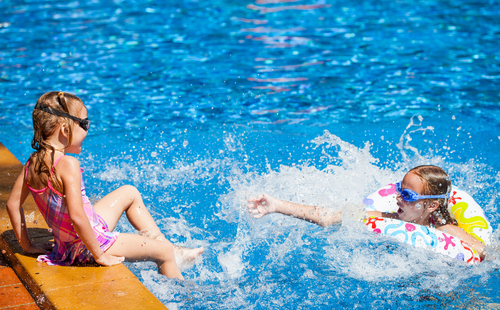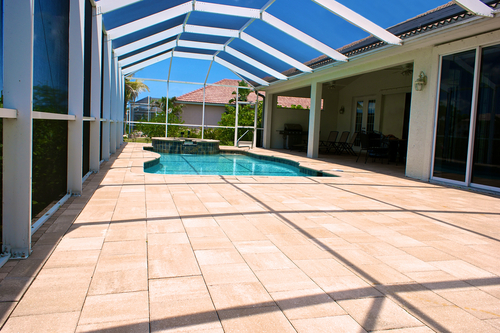
We have already had record-breaking heat waves this summer and not just in the south. This is a weather trend that appears to be staying. Whether this is a result of global warming or not, you don’t want your pool to become a large warm-water bathtub. You are especially at risk of overheated pool water if you own or plan to install an above-ground pool that is six feet deep or less, as the exposed sides of the pool allow the water to be heated by the air temperature surrounding the pool as well as the sun on the surface of the water.
If you have a pool with a darker-colored liner, you are at risk of uncomfortable water temperatures. The dark color will absorb the heat rather than reflect it. In the summer, with many areas of the country experiencing triple-digit temperatures, all pools are at risk. The ideal water temperature for most pool owners is between 80-90 degrees. What can you do to keep your backyard pool the refreshing, cool, and relaxing interlude in your day? Here are 8 suggestions.
Run your pool filter at night. If you run the filter at night, the air temperature is lower and, if you have an in-ground pool, the pipes are in the cooler ground, so you will lower the temperature of the water slightly.
Use your solar panels at night. While the purpose of the solar panels is to heat the water, if you run the water through the panels during the cool night, it will have the opposite effect. Called nocturnal cooling, as the water travels through the solar panels at night, the water will be cooled before it returns to the pool.

Install a water fountain. Water fountains can be retrofitted to your return jets if the pool does not have a fountain included in the design when built. When the fountain is running, a certain amount of water will evaporate. The evaporation process will draw heat out of the remaining water. Run the fountain at night when the air temperature is lower for maximum cooling effect.
Install a Reverse Cycle Heat Pump. Like solar panels, the heat pump is generally installed to heat the water but, if you have a reverse cycle heat pump, it can also be used to cool the water. With a flip of a switch, the water will be directed through the heat pump and cooled rather than heated.

Shade the sun. Many homes in the south have their pools enclosed in a screen house to protect everyone from unwanted insects and air-borne debris. They also block the passive solar energy of the sun and help minimize the heating of the pool water. There are also pool canopies available that will give your pool at least partial protection. If covering the pool with a structure is not feasible, consider landscaping to block the sun. Remember that it will probably take a few years before the landscaping has matured enough to achieve the desired effect.
Drain and refill your pool. This is also a more extreme method to cool the water. In this case, you would drain a large amount of the water from your pool, perhaps half, and replace it with fresh, cold water. Depending on the source of the replacement water, this can substantially lower the temperature of the pool water, especially if the replacement water comes from a well. The obvious disadvantages include wasting the water that is drained and the need to rebalance your pool water, after refilling, with appropriate pool chemicals.
Use evaporative coolers. Evaporative coolers have been used with success in southern states. They work by lowering the temperature of the pool water through evaporation. While they are less expensive than a heat pump, they can only cool the water. There is no capability to heat the water, so the Reverse Cycle Heat Pump may be a better choice, depending on your location and how you use your pool.
Use a white pool cover. Most pool covers are used for safety or to raise the temperature of the pool water. However, a reflective or white pool cover can help to keep the pool water temperature stable and prevent the continual temperature rise due to the effect of the sun. Cover the pool during the day and uncover at night.
Try these ideas to help make your backyard pool the cool retreat you need in the heat of summer.
 Hello Guest,
Hello Guest,  0 item(s)
0 item(s)
